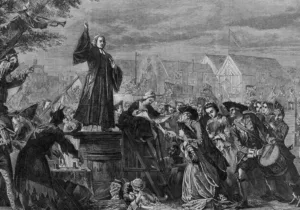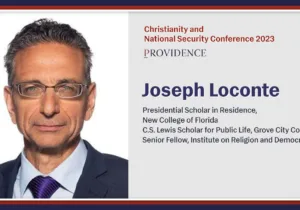Julian Jackson’s new biography of Charles De Gaulle, both wonderful and definitive, contrasts his subject’s vision of nation with that of his nemesis Marshal Philippe Petain.
In surrendering to and collaborating with Hitler, Petain, the hero of Verdun in WWI, saw France as a geographic and political entity whose survival required this cold if demeaning practicality. The new European order was centered around the Third Reich, and France would seek national rejuvenation as its subordinate partner.
De Gaulle, virtually the only member of government, and a very junior one, to reject the armistice and leave France in the immediate aftermath, rejected this seemingly practical accommodation. In his later memoir, he recounted he had always had a “certain idea about France,” and this vision of his nation as permanent, grand, and free sustained his initially lonely resistance to accommodation with Germany.
For De Gaulle, France was not just a people or geographic unit that could and should make ostensibly pragmatic accommodations resulting in its subordination to and collaboration with a sinister enemy to France and the world. Petain’s Vichy regime was legally selected by the parliament, but its depraved indifference to decency and honor deprived it of moral legitimacy. Legitimate and true France would resist and fight on until liberation and restoration.
In this abstract vision of noble France De Gaulle was informed not just by his nationalism and sense of history but also his deep Catholicism, which the more cynical and despairing Petain lacked. Men by force of arms may impose a dishonorable governance upon France, but God ultimately presides over nations and rulers. The Third Reich and its collaborators will fall, and the true France, as God ordained, will re-emerge.
What is the true America, ordained by Providence? This question is important especially on Memorial Day, which honors America’s war dead. Did they die only in defense of their land and political entity (which is important enough)? Or did they also die in pursuit of a broader American ideal?
Some political philosophers call America not so much a nation but an idea, based on the affirmations of liberty and equality of the founding charters. But this claim is incomplete, as American ideals can’t be distinct from the American people themselves, our history, geography, culture and political reality.
Yet all nations, as De Gaulle knew, are more than their physical and practical realities. There are ideals and visions to which they must be faithful if they are to survive and thrive with decency and honor. We most elevate and honor Memorial Day by recalling America’s highest vision of itself, articulated in founding documents, and lived out in our nation’s best moments.
There is of course a trend today popular with our national cultural elites to stress America’s worst moments and moral failures as most definitive. In this narrative, America is primarily a history of repression against victim groups who must struggle for validation and reparation. This narrative is only partly true, and in its fragmentary claims, divorced from the higher vision of liberty and equality for all, is false.
The war dead whom Memorial Day honors were individually frail, sinful and faulty humans subject to the best and worst of their era. But collectively, and in most cases individually, they gave their lives for America’s unique and magnificent aspiration for government based on God-given human dignity. In this vision they are heroes who merit our national gratitude and remembrance.
In the Christian vision of human affairs both mendacity and virtue are always commingled. Amid human depravity, there is also divine redemption. We don’t ignore the former, but with hope emphasize the latter.
De Gaulle in 1940 escaped his nation alone, with only a few suit cases, while most of his countrymen acquiesced to defeat and darkness. Even most of the French soldiers rescued at Dunkirk declined to join De Gaulle and instead returned to occupied France and German captivity. Yet the Gaullist vision and myth of Free France, refusing to yield to the passing moment, prevailed.
By divine grace, America has never faced what France suffered in 1940. May she never. But at every moment America is challenged by its sins, failures and acquiescence to supposed practical reality. Every Memorial Day should call us to reflection, repentance, and gratitude. God has spared and blessed us, despite ourselves. So what must we do now in response to His unmerited favor?
Memorial Day honors hundreds of thousands who died to sustain our nation’s highest divinely inspired ideals. How do we now best keep faith with their sacrifice? May God grant us wisdom to answer wisely.







 Live in the DC area? Sign-up for Providence's in-person events list!
Live in the DC area? Sign-up for Providence's in-person events list!